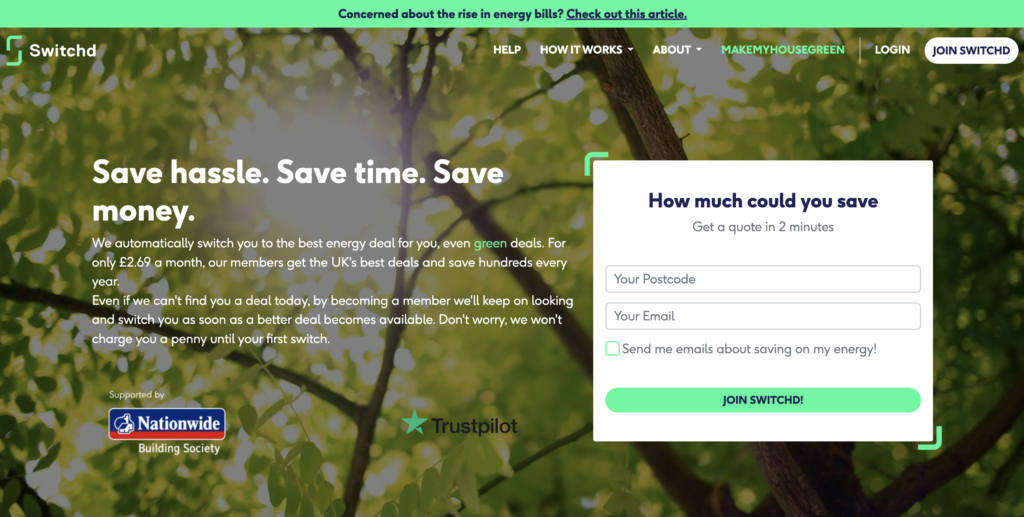Not sure how and where to switch to for the best deal on your utilities? We outline today’s cheapest energy providers in the UK, as well as all the ways to switch and save.
Are you concerned with the high cost of energy prices? Switching to the cheapest energy providers in the UK could save you hundreds a year.
You could also save a decent amount by being savvy about your electricity and gas use to cut energy bills.
If you’re fed up with inflated costs (like the 4-in-10 households finding it hard to keep up with their energy bills), there’s a lot to think about before switching. As if navigating the minefield of fixed and variable rates, price caps, and price guarantees isn’t enough, you’ll also need to consider the best way to switch providers.
Let’s make it all a lot easier for you, and make your energy bills more bearable.
Quick Verdict
Make The Switch:
Don’t let high energy bills be a strain on your wallet. Use strategies like comparison sites, direct research, and automatic energy switching services to keep on the lowest energy tariffs. Fixed-rate deals offer stability and peace of mind, while variable rate offers could save you more if energy prices drop.
Be Savvy About Energy Use:
Beyond switching, embed smarter energy use habits to reduce energy consumption and cut bills. Unplug those appliances, dry your washing using wind and solar energy, and tell others to turn the light off when they leave a room unoccupied!
Invest In Insulation & Solar:
Insulating your home could save between £150 and £250 a year on average. The payback on solar can be much bigger – hundreds or more each year.
The Cheapest Energy Providers In The UK
Let’s get stuck in, shall we? Here’s our most up-to-date list of the cheapest energy prices at the time of writing.
A word of warning, though – it’s a fluid list and you should always check with providers before switching to make sure you are getting the most-up-to-date deal (more about how to do this later).
One-Year Fixed-Rate Deals
All these deals are for a fixed period of one year:
Ovo Energy 1 Year Fixed + Boiler Cover 15 February 2024
| Low User | Medium User | High User |
| £1,131 | £1,610 | £2,313 |
For this deal, you must take boiler cover. If you wish to switch out before the end of the fixed-rate term, it will cost you £75.
Outfox The Market Fix’d 24 4.0
| Low User | Medium User | High User |
| £1,177 | £1,665 | £2,380 |
Utility Warehouse UW Fixed Saver 13
| Low User | Medium User | High User |
| £1,212 | £1,720 | £2,462 |
With this deal, you’ll need to buy more than one service from Utility Warehouse, and an early exit from the deal will cost £75 per fuel.
EDF Energy Essentials 1Yr Mar25
| Low User | Medium User | High User |
| £1,222 | £1,697 | £2,392 |
Like the Utility Warehouse offer, you’ll need to pay £75 per fuel to exit the deal early.
Longer-Term Fixed-Rate Deals
If you want to commit to a longer-term fixed-rate deal, then this is the best I can find at the time of writing:
E.ON Next Fixed 24m v8
| Low User | Medium User | High User |
| £1,220 | £1,695 | £2,388 |
Because of the longer term, the exit fees are set at £150 per fuel.
Fixed Rates V Variable Rates
You’ll notice that all the best energy deals now are fixed-rate offers. However, this doesn’t mean one of these offers is best for you. It could be that a variable rate offer is the one to choose.
Here’s what you need to know about the fixed and variable rates before you decide:
Fixed-Rate Tariffs
A fixed-rate tariff locks in energy prices for a set period. Whether the price of energy moves up or down, you’ll be paying the rate agreed at the outset of the deal. Your actual energy bill will depend on how much energy you use.
This type of pricing gives you peace of mind, especially if you think energy prices might rise. It also makes budgeting easier and more predictable.
On the downside, if energy prices fall, you’ll miss out on the lower prices and any savings you might have made. Plus, most fixed-rate deals come with exit fees, meaning if you do want to switch provider in the middle of your fixed-rate term, you’ll pay a penalty.
Variable Rate Tariffs
When you’re on a variable rate tariff (also called standard rate), the price you pay will fluctuate as wholesale energy prices move, as well as other factors that affect pricing, like regulatory changes and the supplier’s pricing strategy.
This type of deal is very flexible – there are no exit charges, so you can switch providers without incurring additional costs. You will also benefit from falling energy prices, though if wholesale prices rise your energy costs will, too.
This variability makes it more challenging to budget with any certainty.
Should You Opt For A Fixed Rate?
This is one of the most crucial questions to answer when considering switching energy providers.
Currently, there are more fixed-rate energy offers than there have been for a couple of years. This is usually the case when providers expect energy prices to fall.
With the energy cap falling from £1,928 to £1,690 at the beginning of April 2024, and then forecast to fall further to around £1,500 by the end of the year, a fixed-rate deal could lock you into higher energy prices than you might otherwise pay over term.
Having said this, fixed-rate deals are usually set competitively in periods when the energy price is expected to fall.
Which type of tariff is best for you depends on your appetite for price risk and whether you prioritise stability over flexibility.
The Energy Price Cap
In 2019, and in response to ‘energy poverty’ in the UK, the government introduced the energy price cap. This is a measure designed to limit the maximum price that energy providers can charge for each unit of electricity or gas – a ceiling above which energy suppliers cannot increase their standard variable energy prices.
The idea of the energy price cap is to protect consumers from excessive price increases, making the market more transparent and fairer.
However, critics of the price cap argue that it creates a target for energy prices, in the same way that speed limits on our roads create a target for drivers to accelerate to.
The energy price cap is set by the UK’s energy regulator, Ofgem (Office of Gas and Electricity Markets) four times each year. They consider factors such as wholesale energy costs, the cost of maintaining and upgrading the energy network infrastructure, operating costs of providers, and government policy initiatives (such as green energy).
The energy price cap should:
- Protect you from sudden price spikes
- Help you to benefit from decreases in the wholesale price of energy
- Provide a benchmark when considering switching and the competitiveness of providers’ prices
The Energy Price Cap: A Common Misconception
While the energy price cap is a tool to put a lid on energy prices, it does not mean it will limit your bills!
What you use still dictates the size of your energy bills. If you mismanage your energy usage, your energy bill will be higher than it could be.
Energy Price Guarantee
You may have heard about the Energy Price Guarantee (EPG). This was introduced by the government to cushion households against soaring energy prices.
It sets a maximum that energy providers can charge the typical household for the average energy bill. Again, this doesn’t mean your energy bill will be capped – this will vary according to how much energy you consume.
The current EPG is set at £3,000 per year, meaning the Energy Price Cap would have to increase to more than this for the EPG to have a real effect – though it is used to align costs for direct debit and comparable PPM (prepayment meter) customers, so that PPM customers don’t pay a higher price for their energy.
Should You Switch Energy Providers?
Switching energy providers could save a significant amount on your energy bill. You might also receive better service from a new energy provider.
Before making a move, you’ll need to weigh up the pros and cons by asking yourself these questions:
Will You Save Money?
This will likely be your primary motivation for switching providers, and energy providers often offer new customers some of the best deals.
These could be cheaper than your current tariff, especially if you have been a loyal customer of your current provider for some time, or you’re on a standard variable rate.
Are the Tariff Conditions Better?
It always makes sense to look beyond price, and dig down into the T&Cs of an energy deal. You could find that the conditions are better for your energy usage habits, or there is a choice between fixed and variable rates, or tariffs that support renewable energy.
You may even discover loyalty rewards (like Octoplus from Octopus Energy).
Is Customer Service Better?
Do you have problems with the customer service of your current provider? It’s no fun being stuck on hold for hours, and then getting cut off for no reason, is it? Indeed, it’s a big enough reason for many of us to switch.
Search out customer reviews and consider how easy it is to contact customer support, and their efficiency of handling queries and issues.
Are There Exit Fees To Consider?
Before you make the switch, make sure that you’re happy with your obligations under the new contract.
Many of the best fixed-term tariffs come with exit fees if you leave before the end of the contract period – and these could wipe out any gains you make from a lower tariff.
How To Switch Energy Providers
So, you’ve decided to switch energy providers. The question now is, how?
Most switchers will rush to a comparison website, but this certainly isn’t the only option. You could choose to do your own research and contact an energy provider directly, or sign up to an automatic switching service.
Comparison Websites
Using an Ofgem accredited price comparison website – like Uswitch, Compare the Market, Go Compare, or Energy Helpline – is a popular method to find better energy deals. The platforms provide a comprehensive view of available tariffs, and are easy to use.
All you need to do is input your details (including current energy use) and you’ll receive a personalised list of potential providers, with details such as potential savings, tariff types, and contract lengths.
Select the best for you, and make the switch online.
(Tip: Don’t limit yourself to only one comparison site. Make sure you get the complete picture by following the process across several comparison sites.)
Direct Switching
If you’re prepared to put in the legwork yourself and take the time to do independent research, then direct switching may be for you. Most of the information you need to make your choice will be found on the websites of individual providers.
When you have decided which is best for you, contact that provider and request the switch. They will complete the process for you.
Use an Automatic Energy Switching Service
Automatic switching services (like Switchd, Switchcraft, and Homebox) are designed to make sure you are always on the best deal. These are gaining in popularity for their set-and-forget, hassle-free service.

They monitor energy prices across the market and compare with your energy usage data, making automatic switches in line with your preferences: everything is managed for you.
(Tip: These services are super convenient, but you should make sure you are happy with the service’s terms and conditions, as some may have limitations on the deals or suppliers they consider.)
How To Save Money On Energy Bills
Whether you switch energy providers or not, the biggest factor in how big your energy bills are is your household.
Finding ways to reduce your energy consumption and getting into good habits can cut your bills overnight. Here are a few tips to help you save money on those annoying energy bills.
No-Cost Ways To Cut Energy Bills
Unplug Appliances
Those stand-by indication lights are slowly eating your electricity. Even things like phone chargers draw energy when they are not in use.
I did an experiment a year ago, and compared my energy use with appliances on standby and appliances unplugged. The result? £12 savings a month – £144 a year.
Cooking More Efficiently

Put lids on pots and they boil faster. Using your pressure cooker, microwave, or air fryer instead of a conventional oven can also save energy – though you’ll need to figure this out before cooking.
Switch Off
Turn off your lights when you leave a room! No explanation necessary – though you might need to be persistent with your kids.
Lower Your Laundry Settings
Wash clothes at a lower temperature and dry naturally. Lower temperatures use less energy, and wind and solar power are free (unplug that tumble dryer).
Low-Investment Energy Savers
Change Your Bulbs
Switch to LED bulbs as your existing bulbs blow. These use up to 80% less energy – but still turn off when you leave a room!
Monitor & Maintain Warmth
Seal gaps in doors and windows with weather strips to prevent heat escaping in the winter and help keep your home cool during the summer months.
Use smart thermostats that adjust heating and cooling around the home according to your schedule and habits. Buy energy efficient appliances when your existing appliances need replacing, and service your boiler regularly to ensure it is working efficiently.
Higher-Cost Investments That Save You Money
Just like investing to achieve your financial goals, it can pay to invest bigger money to reduce your energy bills. We’re talking about insulation and installation here.
Insulating your loft, walls, and floors can keep your home warmer in the winter and cooler in the summer, thus reducing the need for heating and cooling. Estimates of potential savings range from around £150 to £250 on the average energy bill.
Home insulation could also be cheaper than you think, thanks to the Great British Insulation Scheme, which provides financial support to help with the costs of insulating homes. You can check if you are eligible for support on the government website.
Another major investment you could make is in solar panels for your home. I know what you’re thinking – “In the UK, with our weather?” A fair point, until you hear about real-life experiences of those who have had solar panels installed; my brother being one of them.
“I had my solar system installed in September 2022. It’s a 4.6KW system with a 5KW battery. My home is a three-bed semi, and there are two people using electricity all day every day. My annual energy bill is £700, but without solar it would be nearer to £1,400.”
His bill is going to reduce further soon. Because he’s going to install a smart meter that allows him to export excess electricity.
“I’m switching up to E.ON Next,” he told me. “I’ll get paid 16.5p for every KWh I export to the grid. That’s worth around another £200 per year. My solar system cost me around £11,500, but I’ve already made 13% return on that. I think it will have paid for itself in another seven years.”
He might be underestimating the return on investment, too. Some studies in the UK report that installing solar panels could increase the value of your home by as much as 25%. The government suggested a more conservative figure of 14% in 2013.
The Bottom Line
In a world where every penny counts and energy costs have soared, reviewing your energy bills and switching to the cheapest energy providers should be a habitual part of your annual financial review.
But the decision to switch is peppered with many considerations to make, from choosing between fixed and variable rates to figuring out how energy price caps and guarantees might affect you.
Right now, there are several fixed-rate deals that promise peace of mind with stable prices that make household budgeting much easier. Having said this, variable rate deals can be attractive – they’re usually more flexible and offer potential savings if energy prices fall.
The timing of a switch, as well as the contract conditions of your new provider, could have a significant impact on your energy bills and financial wellbeing.
If you’re considering switching to a cheaper provider, then using comparison websites, doing your own research, or signing up with an auto-energy switching service are all viable strategies to save money on energy bills.
Beyond switching providers, there are many ways to reduce your energy use and cut your bills. Many of these won’t cost you a penny. If you have the money to invest upfront, home insulation and solar panel installation could pay big energy-saving dividends.
In short, stop grappling with high energy bills. Take back control – use the cheapest energy providers, get into energy-saving habits, and invest to save (and make) money on your domestic energy.

